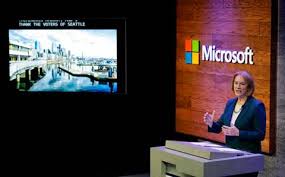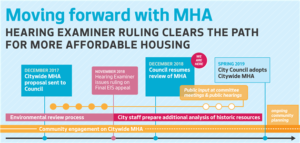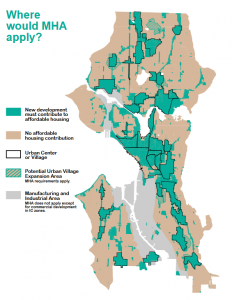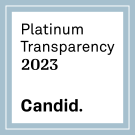MHA is a Win-Win for Seattle Housing Affordability
Seattle is finally moving forward to pass Citywide Mandatory Housing Affordability (MHA), which would require all new development, no matter where it is built in Seattle, to contribute to affordable housing. This is long overdue. Non-profit developers stand ready to expand access to affordable housing with an infusion of MHA resources.
There is a broad sentiment in our community for changing the status quo on housing. In its recent
announcement, Microsoft boldly supported policy changes including increased density and reduced parking and other land use changes consistent with the MHA approach. They put up $500 million of corporate dollars to demonstrate that all parts of our community need to advance solutions.
The Mandatory Housing Affordability program requires private developers to contribute to affordable housing by either including affordable units on site or making a payment to support the creation of affordable housing. Unfortunately the Seattle Times Editorial titled “Engage to save Seattle neighborhoods” misrepresents and undervalues the beneficial impact of the financial resources and production of housing that will result from MHA.
Both of MHA’s housing production methods have positives. When for profit developers include
affordable apartments on-site, they provide mixed-income buildings in the areas of greatest growth. When they make a payment in lieu of on-site performance, the City uses those contributions to address priorities not being met by the market, such as producing 2 or 3-bedroom, family-size apartments, and supporting projects serving seniors, homeless or special needs.
The City has a strong track record of deploying resources from the Seattle Housing Levy, Incentive Zoning payments – and now – MHA payments, into affordable housing. Mayor Durkan recently announced funding awards of $75 million dedicated to build and preserve 1400 affordable rental homes. Although this was the City’s biggest annual commitment ever, it necessitated a great triage of resources as the total applications received by the City were over $240 million dollars. Many proposals, with land and plans in hand, are on hold until more MHA payments flow.
Mercy Housing Northwest alone has a pipeline of housing that will serve nearly 500 households, including at transit sites in Mt. Baker and Roosevelt and at Magnuson Park. These would simply not be possible without City financial support.
The Seattle Times has had excellent reporting on the numbers and the human impact of our area
housing crisis in their Project Homeless series, in the FYI Guy columns and in their real estate reporting. It is puzzling that the editorial board can read their own reporting and rather than feel a sense of urgency, simply suggest more delay on what has been 3-years of process, study and fair time for appeals.
Delaying MHA won’t stop growth or contribute to affordable housing. During this long boom, developers have built with lesser affordability requirements. The delays in adopting MHA due to a protracted appeal are conservatively estimated to have cost $87 million in developer contributions or over 700 affordable homes that would have been built if the program were in place.
MHA is the product of years of analysis and community engagement. It is time to move beyond a static view of neighborhoods and embrace this requirement to harness the capacity and resources of the private sector, as well as to provide leverage to nonprofit developers, to improve housing options for everyone.
Take Action:
Author-Bill Rumpf is President of Mercy Housing Northwest. Mercy Housing is one of the nation’s largest affordable housing organizations and is a member of the Housing Development Consortium of Seattle-King County.





